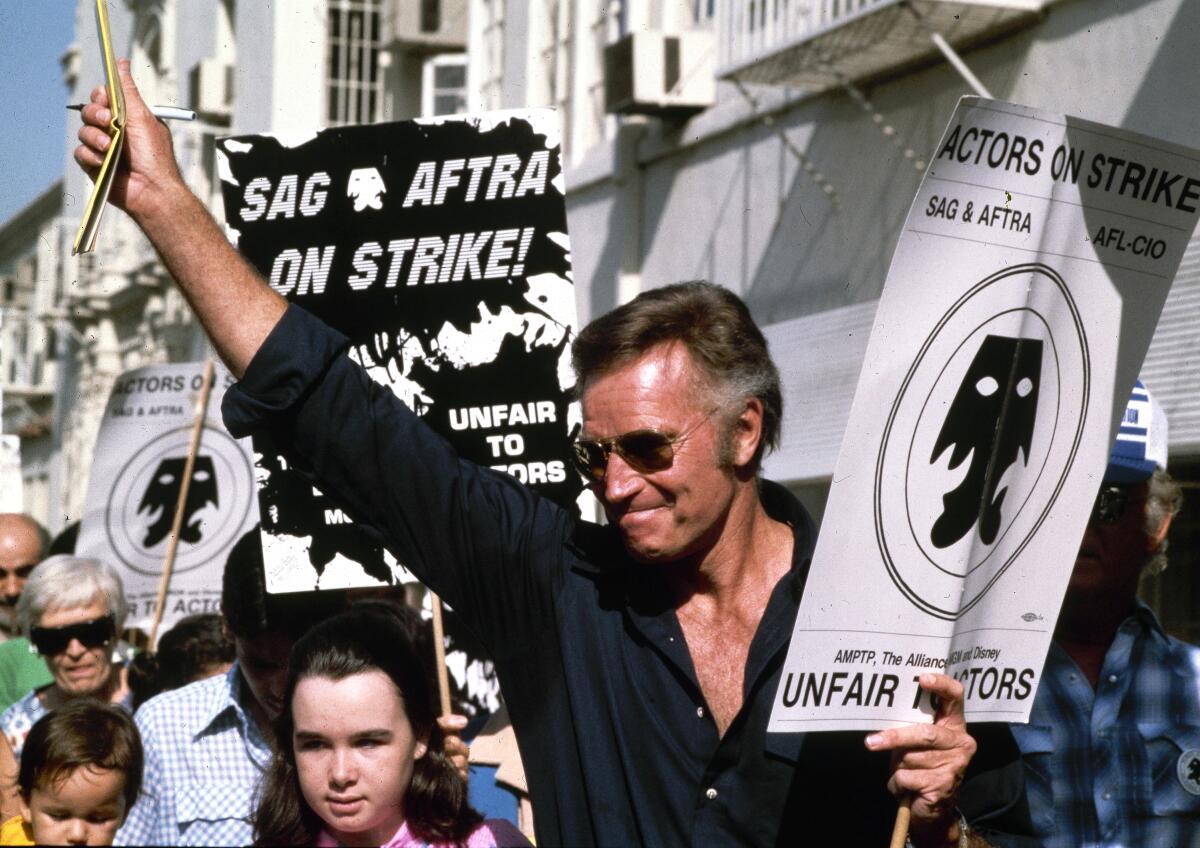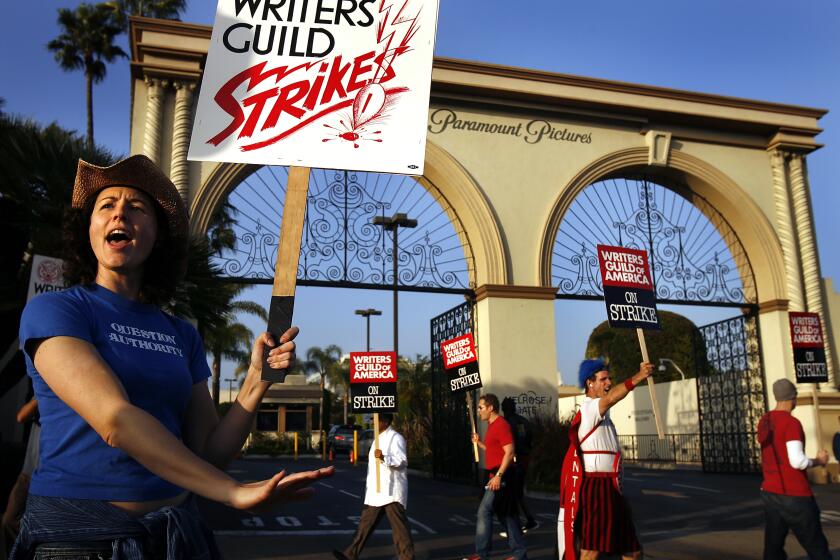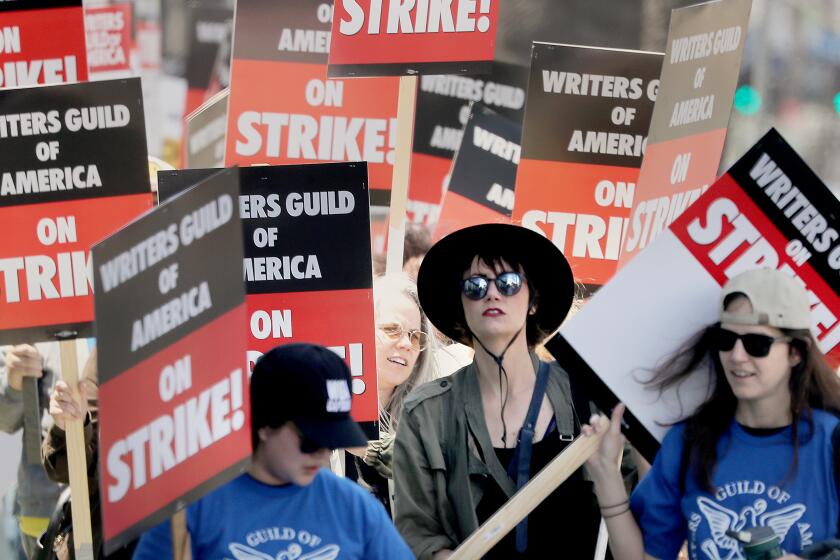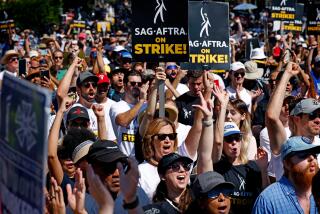Column: Ed Asner warned us about Hollywood’s summer of labor unrest 40 years ago
On Monday, more than a month into the writers’ strike, SAG-AFTRA members agreed that if the Alliance of Motion Picture and Television Producers fails to offer them an acceptable new contract by June 30, they too will strike. Should that happen before the WGA and the AMPTP settle their differences, it would be the first time writers and actors have walked off together since 1960, further disrupting television and film production.
For the record:
4:52 p.m. June 7, 2023An earlier version of this story said that if SAG should strike while the WGA was still striking, it would be the first time both guilds were on strike simultaneously. It would be the first time since 1960.
It’s a rare though not unforeseen situation. If anyone in SAG-AFTRA believes in ghosts, they should be on the lookout for the specter of a balding man standing 5’ 7” with bulldog shoulders, highly significant eyebrows and a picket sign reading, “I told you so.”
Ed Asner may have died almost two years ago, but for more than 40 years, he repeatedly predicted the very mess Hollywood finds itself in now.
When actors walked out in 1980, Asner, then-star of “Lou Grant,” a successful spinoff of his iconic role on “The Mary Tyler Moore Show,” became one of the most prominent voices of the strike. Like the one Hollywood is currently facing, it revolved, in large part, around residuals, then for cable networks and VHS tapes. Asner, still the most Emmy-winning male performer of all time, believed passionately that the studios needed to create a fair and expandable system to ensure that actors were paid for their work every time it was sold on whatever platform that purchased it.
He believed it so passionately that when SAG accepted a deal that included, among other half-measures, cable networks being allowed to air content for 10 days without paying residuals, he pushed back. “I think it stinks,” he said at the time.
Many SAG members agreed, electing him president the following year. Asner’s time in office was not a dull one — he was criticized for his liberal politics, particularly for his criticism of then-President Reagan — but involved a consistent message of enfranchisement. Among other things, he pushed for a merger with AFTRA (which would not be accomplished until 2012) and lobbied for legislation that made it unfair to use occupation as a metric for pricing auto insurance (actors did not fare too well).
The last strike cost $4.5 billion in today’s dollars. That’s why the studios need to stop preparing for the next one and start trying to prevent it.
More importantly, the man who perfected the crotchety but good-hearted geezer, be he Mr. Grant or “Elf’s” Santa Claus, spent much of his life reminding the world that while many may daydream about what it would be like to be a movie star, most actors are not living the high life or, like Asner, being showered with awards.
It was, and is, an important message. Even more so than writers, actors face a double bind when it comes to labor disputes.

When contract disputes arise, the most recognizable voices are inevitably the most well-known. It can be difficult for the average citizen to sympathize with famous actors, who, with their multimillion-dollar deals and commercial contracts, appear to be doing just fine.
But as Asner never stopped pointing out, most actors, even those audiences see time and again in minor roles, are not making millions; most are scraping by job to job hoping to earn enough to sustain their SAG-AFTRA membership and keep their health insurance.
Indeed, Asner was among those who filed (and won, posthumously) a class-action suit against SAG after it raised the earning requirements for that health insurance and cut 12,000 people from the program.
But his most oft-repeated message was the reminder that actors, at every level, are workers and deserve to be paid for their work, including when that work is sold or resold on an ever-growing number of platforms.
Television’s most recent ‘Golden Age’ set off a gold rush that transformed Hollywood. The writers’ strike means the boom has finally gone bust.
“That same baby has come back to haunt us ever since,” he told Backstage magazine regarding the 1980 contract settlement. “It led to the kinds of problems that we have now, not finding a way to convince management that a formula must be devised here and now, rather than wait three years from now when a new form of electronic marvel will have arrived.”
In 2008, he begged SAG members to vote to authorize a strike. Like the writers, who had gone on strike the previous year, actors believed they were being shortchanged as more content went digital, even as studios argued there was no way to foresee whether the digital business would succeed.
“What all of those with weak knees fail to acknowledge,” Asner wrote in a December op-ed for The Times that year, “is that the business plan for new media is being written right now, and that what we agree to now will become the ‘template’ that the industry will cling to going forward, with no obligation to make charitable revisions.… This deal will take billions of dollars out of actors’ pockets in the same way our bad deal in home video and DVDs has cost actors $4.5 billion in lost compensation over the last 27 years.”
Though the 2008 negotiations were bitter and long, SAG did not take a strike vote and a deal was ratified in June 2009, a year after the old contract had expired.
Now, it would seem, actors find themselves in the situation that Asner predicted: once again attempting to force studios to address, in a meaningful way, the fact that the entertainment business has radically changed in a way costly to the people who create the actual entertainment.
I can’t imagine Asner would be happy about being proven correct, again, but I know exactly what he’d be saying: Hold their feet to the fire now, or you’ll be right back where you started next time around.
More to Read
The biggest entertainment stories
Get our big stories about Hollywood, film, television, music, arts, culture and more right in your inbox as soon as they publish.
You may occasionally receive promotional content from the Los Angeles Times.













